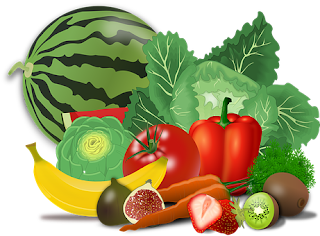During the month of October, I will be participating in the Write 31 Days hosted by Crystal Stine. My category is Food, Health & Wellness and my theme is "Into The Kitchen".
Yesterday's discovery that the pumpkin is actually a fruit instead of a vegetable leads us to question the things we eat. Are they vegetables, fruits or berries?
Years back, before I became somewhat enlightened, I thought that vegetables grew in the ground, fruits and nuts grew on trees and berries on bushes. Still I would have thought that peppers were vegetables. This is one of those things that just when you think you have it figured out, Bam! It is not what you thought at all. We are here to learn what is what because in the natural world, all is not clear.
First of all, what are the botanical definitions of fruits, vegetables and berries.
Vegetables
The word vegetable has no botanical meaning, but is based on the part of the plant and is used to categorize the foods we eat that do not fall into the fruit/berry category.
Plant Part Example
Leaves lettuce
Stems/Stalks celery
Roots carrots
Tubers potatoes
Bulbs onions
Flowers broccoli
Fruit
The fruit is the seed-bearing structure in flowering plants (angiosperm) formed from the ovary after flowering. Fruits are the means by which the angiosperm disseminate seeds.
Berries
Berries are technically a fruit with multiple seeds on the inside surrounded by edible flesh.
To a botanist, tomatoes, eggplants, grapes, persimmons and chili peppers are also berries, so try and wrap your head around that. Based on this definition, a banana is also a berry.
Okay, now that we have some definitions, let's look deeper. We have pretty much established what vegetables are, and that seems fairly straight forward. The more confusing issue is the fruit and/or berry question.
All berries are fruit. There are subcategories of fruits, and the categories some of them fit into may surprise you. Some foods that you know as berries aren't really berries at all. Included are strawberries, blackberries and raspberries. Blackberries and raspberries are considered an aggregate fruit. Aggregate simply means that the fruit is made up of multiple little sections.
 Strawberries are particularly strange because their seeds are on the outside, rather than the inside. For this reason they are known as accessory fruits. Perhaps that is because they wear their seeds like accessories?
Strawberries are particularly strange because their seeds are on the outside, rather than the inside. For this reason they are known as accessory fruits. Perhaps that is because they wear their seeds like accessories?In addition to berries, there are other subcategories of fruit such as citrus, drupe or stone fruit (peaches) and pome (apples).
Wow, that is a lot of information. So what do we take away from this?
Vegetables are leaves, flowers, stems or stalks, roots, bulbs and tubers. Examples of vegetables are potatoes, broccoli, carrots, onions, beets, rhubarb, greens, turnips, Brussels sprouts and asparagus.
Fruits are the seed-bearing part of the plants. Examples are watermelon, all legumes, avocados, squash, pumpkin, eggplant, okra, cucumber, nuts, olives, corn and peppers. You may be questioning why corn is listed here. While eaten as a vegetable or grain, botanically speaking, it is a fruit.
Berries are a subcategory of fruit, and most of what we thought were obviously berries are not.
All this lends new meaning to getting your kids to eat their vegetables.
Sources:
Bananas are Berries?
Wikipedia, multiple entries
Surprising Truth about Fruits and Vegetables
Corn, Is it a Fruit, Vegetable or Grain?
Classifying Fruit is an excellent article detailing the different categories of fruits.
If you enjoyed this post, please leave a comment. I would love to hear your thoughts.


Hi Linda - these are great ... just caught me at a very busy time ... so I'll be skimming by - sorry about that - still later on I can come back and read up properly ... cheers Hilary
ReplyDeleteThere really is a lot to digest here (no pun intended), and there was a lot more that could be written. Nature is very complex.
Delete